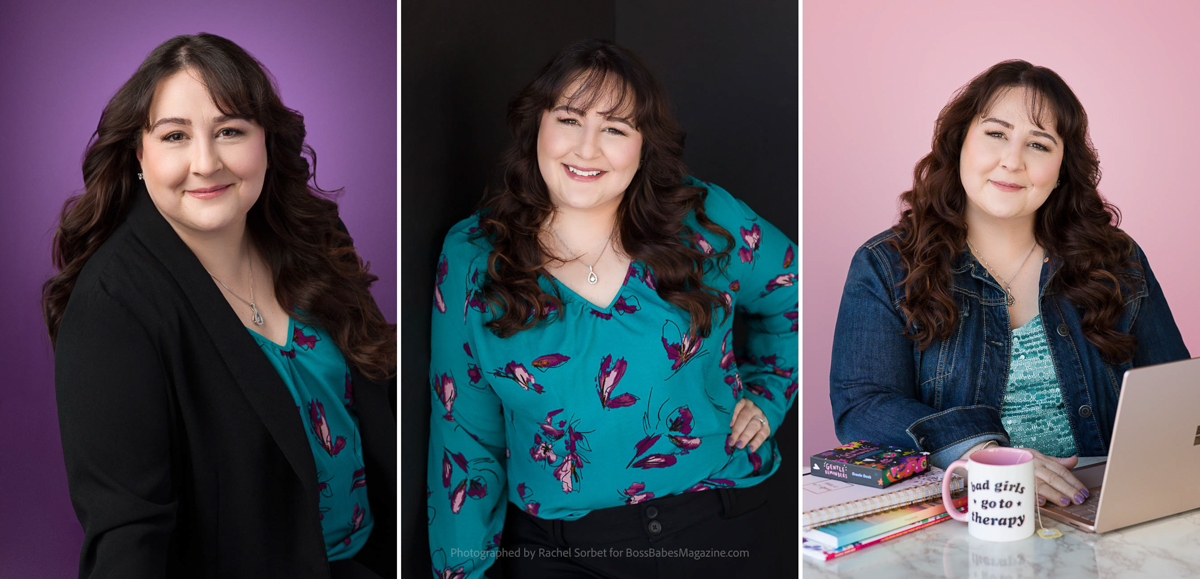What called you to your line of work?
A combination of early influences, personal experiences, and a deep-seated passion for helping others called me to my line of work. Growing up, I witnessed firsthand the challenges that come with mental health struggles within my family and community. These early experiences ignited a desire to understand mental health better and find ways to support those in need. My passion for helping others was further solidified when I became a teen parent. Navigating the complexities of parenthood at a young age while facing societal and personal challenges made me acutely aware of the importance of mental health support and resilience. This experience instilled in me a strong desire to provide the kind of support that I wished I had during those times.
As I pursued my education and began my career, I realized that my calling was to help individuals and lead and mentor other mental health professionals. I wanted to create a positive impact on a larger scale by empowering both clients and colleagues. This led me to roles in clinical supervision and leadership, where I could influence the development of effective mental health practices and advocate for quality care. My professional goals have always been centered around making a meaningful difference in the lives of others, whether through direct counseling, supervision, or leadership. I am committed to fostering environments where mental health professionals can thrive and provide the best care possible to their clients.
Ultimately, I hope to leave a legacy of compassion, resilience, and empowerment in the mental health field. I want to be remembered for my dedication to improving mental health services, supporting my colleagues’ growth, and positively impacting the communities I serve. Both challenges and triumphs have shaped my journey, and it is this blend of personal and professional experiences that continually fuels my passion for my work.
 What does success mean to you?
What does success mean to you?
Success is a multifaceted concept that extends beyond traditional metrics like wealth or status. It encompasses personal fulfillment, professional achievements, positive impact on others, balance, and continuous growth. At its core, success means achieving a sense of personal satisfaction and alignment with my core values, pursuing goals that resonate with my passion for mental health and leadership, and ensuring that my work is meaningful and contributes to the well-being of others. In my professional life, success is measured by my positive impact on my clients, colleagues, and the mental health community. My clients thrive and supervisees grow into competent and confident professionals. Success is also about the accomplishments of my group practice, Lifes Hope Therapeutic Services, and our ability to provide quality care to the community. It deeply involves empowering my clients to overcome challenges, guiding my supervisees, and contributing to the mental health field through education and leadership, leaving a lasting positive legacy.
Maintaining a healthy work-life balance and overall well-being is critical to success. However, it took most of my career to realize the importance of balance and self-care. In the early years, I often prioritized work at the expense of my personal life, leading to burnout and stress. Over time, I learned that true success involves prioritizing self-care, nurturing relationships, and finding joy in my professional and personal life. Success means thriving, not just surviving, and being present and engaged in all aspects of my life.
Finally, success means embracing continuous growth and learning, staying curious, seeking new knowledge, and being open to change and innovation. This translates to ongoing professional development, staying updated with the latest research, and adaptability to new challenges and opportunities. In summary, success to me is a holistic blend of personal fulfillment, professional achievements, positive impact, balance, and continuous growth, making a meaningful difference in the lives of others while staying true to my values and ensuring my well-being.
What does the world need more of? Less of?
The world needs more empathy, understanding, and accessible mental health care. As a mental health professional and leader, I have seen firsthand the transformative power of empathy and understanding in both individual and community settings. Empathy allows us to connect with others deeper, fostering a supportive environment where individuals feel heard and valued. Understanding, particularly in the context of mental health, helps reduce stigma and encourages more people to seek the help they need without fear of judgment.
On the other hand, the world needs less stigma and judgment surrounding mental health issues. Despite progress in recent years, there is still a significant amount of misunderstanding and prejudice that prevents people from seeking help. This stigma not only affects those struggling with mental health issues but also hinders the development of effective mental health policies and services.
From my perspective, increasing empathy and understanding, coupled with reducing stigma and judgment, can create a more inclusive and supportive society. These changes align with my professional goals of providing quality mental health care and empowering both clients and colleagues. By fostering an environment where mental health is openly discussed and supported, we can make significant strides toward improving overall well-being and creating a more compassionate world.
Name your greatest success in your business.
One of my greatest successes in my career has been co-developing and implementing The Empowerment Model of Clinical Supervision. Early in my career, I recognized the need for a supervision model that supported mental health professionals in their clinical skills and empowered them to grow in their confidence and self-efficacy. This realization led me to create a comprehensive model that integrates evidence-based practices focusing on empowerment and professional development. The journey to develop this model was challenging. It required extensive research, collaboration with colleagues, and a deep understanding of the needs of supervisees. I dedicated countless hours to refining the model, ensuring it was practical and impactful. One of the critical elements of the Empowerment Model is its emphasis on strength-based feedback and collaborative goal setting, which helps supervisees feel valued and motivated.
Implementing this model in my group practice, Lifes Hope Therapeutic Services has yielded remarkable results. Supervisees have reported increased confidence in their clinical skills, higher levels of job satisfaction, and a greater sense of professional identity. The positive feedback from both supervisees and clients has been incredibly rewarding, as it demonstrates the model’s effectiveness in fostering professional growth and improving client outcomes.
This success is particularly meaningful because it aligns with my servant leadership and social responsibility core values. It has also contributed to my practice’s overall quality of care, benefiting the broader community. Knowing that I have made a tangible difference in the lives of mental health professionals and their clients is a source of immense pride and fulfillment.
What resources would you recommend to someone starting a career in a similar field as you?
For anyone starting a career or business in the mental health field, several essential resources can provide valuable support and guidance. Joining professional organizations such as the American Counseling Association (ACA) or the National Board for Certified Counselors (NBCC) offers a wealth of resources, including continuing education opportunities, networking events, and access to the latest research. Participating in specialized training programs and workshops, like those offered by the Gottman Institute for Couples Therapy or the Beck Institute for Cognitive Behavioral Therapy (CBT), is essential for developing clinical skills and staying current with best practices. Finding a mentor through professional networks or local counseling associations can provide invaluable guidance and support based on their own experiences. Websites such as Psychotherapy Networker and GoodTherapy, along with online forums and social media groups, provide articles, webinars, and community support to stay informed about the latest trends and techniques. Additionally, having a good lawyer and a strategic accountant is crucial for navigating the legal and financial aspects of running a business. Committing to continuous education through conferences, advanced courses, and peer consultation groups ensures you remain at the forefront of the profession, allowing you to provide the best possible care to your clients. By leveraging these resources, you can build a strong foundation of knowledge, skills, and support that will serve you well throughout your professional journey.
In your opinion, what are the top three things someone should consider before starting a business?
Starting a business, especially in the mental health field, requires careful planning and consideration. Based on my experience, the top three things to consider are:
Clear Vision and Purpose
Having a clear vision and purpose is crucial. This means understanding why you want to start your business and what you hope to achieve. Your vision will guide your decisions and keep you motivated during challenging times. For instance, my vision for Lifes Hope Therapeutic Services was to provide accessible, quality mental health care that aligns with my core values of servant leadership and social responsibility. This clarity has been instrumental in guiding our growth and ensuring we stay true to our mission.
Financial Planning and Sustainability
This includes creating a detailed business plan, understanding your funding needs, and managing your finances effectively. It’s also crucial to have a strategic accountant who can help navigate the financial aspects and ensure your business remains viable. Starting with a strong financial foundation can prevent many common pitfalls that new businesses face.
Legal and Ethical Considerations
Ensuring your business complies with all legal and ethical standards is vital. This includes obtaining the necessary licenses and certifications, adhering to industry regulations, and maintaining high ethical standards in all your practices. Having a good lawyer who understands the specifics of the mental health field can help you navigate these complexities and protect your business from potential legal issues.
By carefully considering these three factors—having a clear vision, solid financial planning, and ensuring legal and ethical compliance—you can set a strong foundation for your business and increase your chances of long-term success. These considerations have been pivotal in my journey, helping me build a resilient and impactful practice.

Christina Murphy MA, LPC, NCC, CPP, ACS is the founder of Life’s Hope Therapeutic Services PLLC, a trauma-informed full-service counseling practice with over 20 providers.
Reprints of Boss Babes Magazine featuring Christina Murphy can be ordered here.
Share this article on social!

Want to be featured next?
Hello, I’m Rachel Sorbet, a portrait photographer in Denver and founder of Boss Babes Magazine. As a women’s business portrait specialist, I found myself being inspired by the career journeys of the women I photographed. My desire to spotlight these incredible women and share their wisdom with the world led me to create this magazine. The publication is a celebration of driven women, their grit, grace, and determination and all career-oriented women are encouraged to apply to be featured.
Related Posts
May 18, 2025
April Steward
April Steward is a Licensed Medical Aesthetician and the founder of Mountain View…
May 4, 2025
Richelle Knowles, D.C.
Richelle Knowles, D.C. along with her husband, Daniel Knowles, D.C. are the owners of…
April 16, 2025
Alexa Potts
Alexa Potts, DNP, PMHNP-BC, APN is a psychiatric nurse practitioner with a private…
April 16, 2025
Laura Freese
Laura A. Freese is a professional Property Manager, Real Estate Broker, and owner of…






